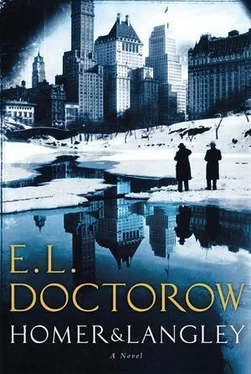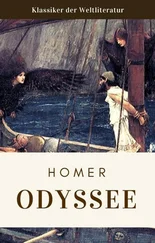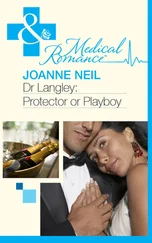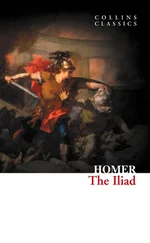GRANDMAMMA’S GRIEF FILLED the house. It was silent, monumental. Our condolences were met with indifference. One morning she announced that she was leaving our employ. She intended to go to New Orleans and find Harold’s widow, whom she did not know, a young girl, she said, who might need her help. Apparently an infant child was involved. Grandmamma was resolute and it was clear to us that these were relationships she would foster, putting together what was left of her family.The day of Grandmamma’s departure she made breakfast for us in her traveling clothes and then washed the dishes. She was taking a Greyhound bus from the terminal on Thirty-fourth Street. Langley pressed traveling money upon her, which she accepted with a regal nod. We stood on the sidewalk as Langley waved for a cab. I was reminded of the day we stood here like this to say goodbye to Mary Elizabeth Riordan. There were no tears and no parting words from Grandmamma as she got into the cab. Her mind was already under way. And so as she rode off the last member of our household was gone, and Langley and I were left to ourselves.Grandmamma had been the last connection to our past. I had understood her as some referent moral authority to whom we paid no heed, but by whose judgments we measured our waywardness.
WHEN THE WAR ENDED with the victory over Japan it was one of those oppressively close August days in New York. Not that anyone minded. Cars paraded along Fifth Avenue, drivers blowing their horns and shouting out the windows. We stood at the top of our stoop like generals taking review, because people were running by as closely as in ranks, thousands of footsteps scuttling downtown looking for the party. I had listened to the same excitement, the laughter, the running feet like the whir of birds’ wings, on Armistice Day 1918. Langley and I crossing the street to the park found strangers dancing with one another, ice cream vendors tossing Popsicles to the crowds, balloon sellers letting go their inventory. Unleashed dogs ran in circles, barking and yelping and getting underfoot. People were laughing and crying. The joy rising from the city filled the sky like a melodious wind, like a celestial oratorio.Of course I was as relieved as anyone that the war was over. But underneath all this gaiety I found myself in an awful sadness. What was the recompense for the ones who had died? Memorial days? In my mind I heard taps.We had a joke, Langley and I: Someone dying asks if there is life after death. Yes, comes the answer, only not yours.
WHILE THE WAR WAS on I had come to feel my life was purposeful, if only in its expectations for the future. But with peace I found there was no future, certainly not in any way to distinguish it from the past. In the light of naked truth I was a severely disabled man who could not expect for himself even the most normal and modest of lives — for instance, as a working man, a husband, and a father. This was a bad time in the midst of everyone’s joy. Even my music had lost its appeal. I was restless, slept poorly, and in fact was often afraid to go to sleep, as if to sleep was to put on one of the gas masks Langley had brought home in which I could not hope to breathe.Have I not mentioned the gas masks? During the war he’d acquired a crateful. He saw to it that two were hung on nails in every room of the house so that wherever we happened to be, if the Axis powers did attack New York, and gas bombs were dropped, we were prepared. Given his lifelong cough and shredded vocal cords, his company having been without masks in 1918 when the fog rolled in, I did not demur. But he insisted that I practice putting on a mask so that when and if the time came I would not die fumbling around. To have my nose and mouth covered in addition to being in the dark was frightening. It was as if the sense of smell and taste, too, were being taken from me. I found it hard to breathe through the canister, which meant I could avoid dying of poison gas only by dying of suffocation. But I made the best of it and did not complain, even though I thought a German gas attack on Fifth Avenue highly unlikely.By the time of war’s end, the productive might of the American economy having overproduced everything a soldier would need, we’d collected, besides the gas masks, enough military surplus to outfit an army of our own. Langley said G.I. stuff was so cheap in the flea markets that it presented a business opportunity. We had ammunition belts, boots, helmets, canteens, tin food containers with tin utensils, telegraph keys, or “bugs,” developed for the Army Signal Corps, a table-top full of olive drab trousers and Ike jackets, uniform fatigues, hard wool blankets, pocketknives, binoculars, boxes of service ribbons, and so on. It was as if the times blew through our house like a wind, and these were the things deposited here by the winds of war. Langley never did work out the details of any business opportunity. So along with everything else, all these helmets, boots, etc. ended up now where they had been deposited, artifacts of some enthusiasms of the past, almost as if we were a museum, though with our riches as yet uncataloged, the curating still to come.Not everything would go to waste — when our clothes wore out we would take to wearing fatigues, both trousers and shirts. And boots too, when our shoes fell apart.Oh, and the oiled M1 rifle that had never been fired. This was one of my brother’s prize acquisitions. Fortunately he hadn’t found the cartridges to go with it. He drilled a heavy nail into the marble mantel and we hung up the M1 by its shoulder strap. He fancied his work so well that he did the same for the Springfield rifle that had been sitting there for almost thirty years. They dangled over the fireplace, the two rifles, like Christmas stockings. We never touched them again and though at this point I cannot get anywhere near the mantel, so far as I know they are still there.
I SHOULD MAKE it clear that I did not wish for another war to lift my spirits. It seemed like just a few moments since V-J Day — that’s what the victory over Japan was called — and we were at it again. I thought how foolish we had all been that day of delirious celebration, the whole city shouting its joy to the heavens.When I played piano for the silent movies the picture would end and the projectionist would stick his head out of the booth. The next feature will begin shortly, he’d say. A moment, please, while we change reels.And so there we were at war in Korea, but, as if we needed something of more substance, we and the Russians were racing to build bigger nuclear bombs than the bombs dropped on Japan. Endless numbers of them — to drop on each other. I should have thought just a couple of superbombs to char the continents and boil the seas and suck up all the air would be sufficient to the purpose, but apparently not.Langley had seen a photograph of the second atom bomb that had been used on Japan. A fat ugly thing, he said, not sleek and sharklike as you would expect a respectable bomb to be. You’d think it was something to hold beer. The moment he said that I remembered the empty kegs and ponies he had brought into the house from a brewery that had gone out of business. He lugged these aluminum barrels up to the front door, somehow lost control, and they bounced down the stone steps clanking and booming and rolling across the sidewalk so that I now thought of the atom bomb as an implodable beer keg, lying on its side and spinning on its axis until it decided to go off.The trouble with listening to the news with Langley was that he became agitated, he raved and ranted, he talked back to the radio. Langley, as an expert newspaper reader, reading all the papers every day, knew what was going on around the world better than the commentators. We’d listen to some commentator and then I’d have to listen to Langley commentating. He would tell me things I knew were true but which nevertheless I didn’t want to hear, all of it just adding to my depression. Eventually, he would stop giving me his political insights, which boiled down anyway to a hope that there would soon be a nuclear world war in which the human race would extinguish itself, to the great relief of God … who would thank Himself and maybe turn His talents to creating a more enlightened form of creature on a fresh new planet somewhere.Whatever the news of the world, with Grandmamma Robileaux gone we were faced with the practical problem of how to feed ourselves. Homer, said my brother, we will take our meals out, and it will do you good to be up and about instead of sitting in a chair all day and feeling sorry for yourself.We had our breakfast at a counter place on Lexington Avenue, a brisk ten-or twelve-minute walk. I’m just thinking a moment about the food: they served fresh orange juice, eggs any style with ham or bacon, hash brown potatoes, toast, and coffee for a dollar and a quarter. I usually had my eggs as an omelet sandwich on the toast as that was easy to handle. For a breakfast it wasn’t cheap but other places charged even more. For dinner we went to an Italian place on Second Avenue, a twenty-minute walk. They had various spaghetti dishes, or entrées of veal and chicken, chopped salad, and so on. It wasn’t very good but the owner saved the same table for us every night and we brought our own bottle of Chianti and so it was passable. We skipped lunch entirely, but in the afternoon Langley would boil water and we’d have tea with some crackers.But then he toted up the month’s dining bills and, forgetting he had prescribed our eating out as a way of improving my state of mind, he decided to cook at home. He sought at first to duplicate the restaurant meals we had had for breakfast and dinner. But I would smell things burning and weave my way to the kitchen, where he was cursing and tossing hot and hissing frying pans into the sink, or I would sit patiently at the table long past the usual dinner hour, starving and in suspense, until something unnameable was laid before me. Langley asked me one day why I supposed I was looking so peaked and thin. I didn’t say, How else should I look given the culinary experiences I have endured? Finally, he gave up and we began to eat out of cans, though he had decided that oatmeal was an essential constituent of good health and put up a batch of the gluey stuff for breakfast every morning.It would take some time before his interest in healthful eating expanded and he would turn his attention to my blindness as something curable via nutrition.
Читать дальше












